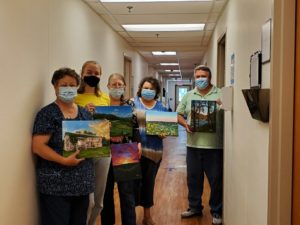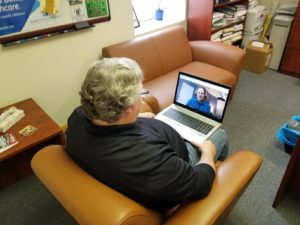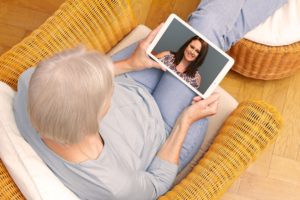Inspiration Stems from Barbour County for Myers Clinic's New Paintings
Barbour County’s Myers Clinic, located in Philippi, is bringing a new sense of familiarity and comfort to its patients. The waiting area of the clinic will now be decorated with artwork done by Barbour County native, Leah Seaman. The artist chose five locations that were special to her and carefully captured each scene through vibrant acrylic paint on an 11×14 canvas.
We sat down with Leah to learn more about her artistic background and how her hometown spawned inspiration for the art project.
 1. First of all, tell us a little about yourself. Where are you from? What are you studying at school?
1. First of all, tell us a little about yourself. Where are you from? What are you studying at school?
I’m 21 years old and currently a senior at Marietta College in Ohio. I’m a double major in communication studies and studio art with a minor in leadership studies. I actually grew up in Barbour County in a little community called Chestnut Ridge. It’s a smaller community based within Barbour County that has a really unique collection of people. There are deep roots established in this community, so you have generations among generations of families that still live here with ancestors who came from the Civil War era.
2. When did you start getting into art? How did this hobby evolve?
Around eighth grade, I had no idea what to ask for at Christmas, so like any good child I asked for an art set and my parents got me a book and a set and my competitive nature pushed me to try to draw the things in the book – and it just kind of grew from there.
But pretty soon in high school I had a family of a former classmate reach out to me and asked me to do a drawing of their family. That first initial job, I think, was the first time I thought ‘there’s something here’.
So, I would say since eighth grade/freshmen year I have really been cultivating my craft, but I never really started to take it seriously until I studied abroad in Florence, Italy two years ago. It was there that I discovered that art is what brings me a lot of joy and fulfillment in life. From there, I really started taking my art seriously.
3. How did you get involved to do this project for Barbour Community Health Association?
Around the time COVID-19 hit, I contacted BCHA about the art project because I was looking for something different to do with my art. And so the conversations just started from there and we eventually came up with this idea. BCHA gave me a lot of free range on this project, which I really appreciated.

4. Why did you choose to focus on Barbour County locations?
The purpose of the project was just to kind of show that there is a really gorgeous side to this community. Historically, Chestnut Ridge had sometimes faced some prejudice and difficulty. So, I really wanted to show that the Chestnut Ridge community is absolutely stunning and show some of the positive sides to the area and display some of the scenes we see on a daily basis. It was really cool to give that kind of representation, especially since a lot of people from this community go to the Myers Clinic, so I’m hoping people will recognize some of the scenes that I’ve painted and become relaxed because going to the doctor’s office can be kind of stressful.
5. What was your inspiration for each piece?
Each painting is of a scene from an area in the Chestnut Ridge community that is either special to me or my family, friends, or neighbors.
The painting entitled “Scenic Overlook from Chestnut Ridge Road” is of a vibrant sunset and is a popular spot for anyone who travels through Chestnut Ridge.
Another well-known spot in the community is the Welch Cemetery – the painting entitled “Scenic Overlook from Welch Cemetery”. You can actually see across Barbour County from this hill and many have family members who have been buried in this cemetery. It’s also my dad’s favorite spot.
The schoolhouse painting I did is called “The Old Croston Schoolhouse” – this school used to be the schoolhouse for all the Chestnut Ridge kids before schools integrated. Now, it’s this really old, beautiful, tattered building with a lot of history. I’m really hoping Chestnut Ridgers recognize this painting.
The farm painting, “Sickler Farm”, is of the Sickler Farm, which is owned by a couple that distributes a lot of their produce out to the community. So, I got permission from them to paint their property and some of the cows in the pasture.

For the “Arden River” painting, I wanted to add more autumn colors into the project. So, I thought I’d paint this because a lot of the Chestnut Ridge community enjoys going down to that part of the river to swim. My mom kind of pushed me to paint this more in fall colors just because all of my other paintings were very green.
6. What’s next for you?
I’m currently working on illustrating my first children’s book, so that’s very exciting. I’m also selling prints for any of the five paintings at Myers Clinic in three sizes: 8×10, 11×14, 16×20.
If you’re interested in Leah’s art, connect with h er via her social media pages: Facebook at Artabella or on Instagram at @Artabella_Gallery.
Barbour Community Health Association to Celebrate 50 Years Of the Belington Medical Clinic
Barbour Community Health Association to Celebrate 50 Years Of the Belington Medical Clinic BELINGTON, WV (Sept. 28, 2023) – Barbour Community Health Association (BCHA)
HPV Vaccine Myths Busted!
HPV Vaccine Myths Busted! Human Papillomavirus (HPV) is the most common sexually transmitted infection in the US. HPV is a virus that can lead
Q&A WITH OUR NEW CHIEF MEDICAL OFFICER, JOHN HENDERSON, MD
Q&A with our new Chief Medical Officer, John Henderson, MD Barbour Community Health Association is delighted to announce the promotion of Dr. John Henderson,







